Donald Trump, John Kasich Face Big Tests In Michigan
Both Donald Trump and Ohio Governor John Kasich face big tests in tomorrow's Michigan primary.
With Michigan’s primary one day away, Donald Trump is waiting to find out if his efforts to appeal to blue color voters will work in the Midwest, and Ohio Governor John Kasich faces his first big test of the 2016 campaign:
WARREN, Mich. — Neil Mortensen remembers how neighbors lost factory jobs in this suburb north of Detroit, and then, inexorably and sadly, their homes.
“I’d see all these businesses that used to produce normal products, even brooms, that everybody uses and purchases today, but are not produced here — they are produced overseas,” he said.
A construction manager, Mr. Mortensen escaped the waves of layoffs because his employer, which once built plants for heavy industry, is now in the demolition business. “Those factories are gone, and I get to knock ’em down, unfortunately,” he said.
Which is how he and his wife, Kathy, ended up at a rally for Donald J. Trump, the anti-free-trade billionaire who promises to slap 35 percent tariffs on Ford cars built in Mexico. “We’re hopeful that Donald can bring those jobs back, and our neighbors, too,” Mr. Mortensen said.
Mr. Trump’s appeal to blue-collar voters, mostly whites, is driving his popularity in Michigan, where he has a polling lead ahead of the Republican primary on Tuesday. And these same voters, who historically supported Democrats, are at the core of his strategy for winning the general election and turning Democratic-leaning Rust Belt states back into the red column.
Mr. Trump’s rally here on Friday was in Macomb County, where political strategists first identified the phenomenon of Reagan Democrats. These white, working-class voters felt the party no longer protected their economic interests as it focused on affirmative action, welfare and other policies aimed at minorities.
If he is the nominee, Mr. Trump argues, he can deliver not only Michigan but other Rust Belt states, like Ohio and Pennsylvania, into the Republican column in November, broadening the party’s traditional road to the White House.
A “normal Republican,” Mr. Trump said at Macomb Community College, “cannot think of bringing in Michigan, and if you don’t bring in Michigan, it’s tough. You have a very narrow road.”
“But I’m going to bring in places like Michigan,” he said, pledging to win back a once-solid Republican state that has supported Democrats in the last six presidential elections.
The strategy might be a necessity if the party nominates Mr. Trump, because he would risk losing states, like Florida and Colorado, with large Hispanic populations. He has highly unfavorable ratings among Hispanic voters because of his call for a wall separating Mexico and his pledges to deport 11 million undocumented immigrants.
Mr. Trump’s signature issues of opposition to free trade and a crackdown on illegal immigration, which Republican leaders once dismissed as outside the mainstream, have brought him a populist following, including independents and some Democrats.
“I like what he wants to do with the immigration,” said Marvin Bryant, a former salesman who attended the rally in Warren. Mr. Bryant switched his registration from Democrat to Republican last year, and plans to vote for Mr. Trump this week.
Kurt Reidt, a captain of the Warren Fire Department, said his vote for Mr. Trump on Tuesday in the state’s open primary would be his first ever for a Republican. “This is probably the worst state in the country with the economy,” Mr. Reidt said as he entered the rally with members of his firehouse.
Although Republican nominees for decades have carried the vote of white men without college degrees, they are a shrinking share of the electorate. Mr. Trump’s ability to win Rust Belt states in a general election would require him to turn out these voters in historically large numbers.
(…)
Mr. Trump spoke extensively in Macomb County about his plan to bring back manufacturing jobs, especially automotive jobs. He said he would pick up the phone to call the chief of any American company that moved factories to Mexico and threaten a 35 percent tariff (even though the president does not have that authority, and experts say if Congress agreed, it would likely set off a trade war).
“Within 24 to 48 hours” of such an ultimatum, Mr. Trump claimed, the chief of Ford would be on the phone. “They’ll say: ‘Mr. President, we’re moving back. Would you like us to move to Michigan?’ I’ll say, ‘Yeah, I really want you to move to Michigan.’ And they’ll move back.”
Since entering the race, Mr. Trump has harped on Ford’s investment of $2.5 billion in a Mexico plant. The automaker’s chief executive, Mark Fields, has said he sent Mr. Trump a letter pointing out that the company had also invested $10 billion in the United States and created more than 25,000 jobs since 2011.
Representative Sander M. Levin, a Democrat who represents Macomb County in Washington, and who has opposed major trade deals for decades, said Mr. Trump was playing on people’s fears with no practical solutions. “He pushes the buttons, but there’s nothing behind it,” Mr. Levin said. “The 35 percent tariff thing isn’t workable.”
“I think people more and more will realize it’s demagogic,” he added.
But a sampling of two dozen voters who heard Mr. Trump on Friday turned up little skepticism about his promises. They felt strongly that he was the lone truth teller in the race. Many said they were doing well economically, even while painting a grim portrait of the state and the nation on issues like immigration and national security.
Although the number of private-sector jobs has not returned to prerecession levels, Michigan’s unemployment rate has fallen to 5.1 percent, down from nearly 15 percent at the height of the recession.
Detroit’s automakers are experiencing record sales.
Nonetheless, the narrative of decline is pervasive, especially because many of the new jobs being created pay far less.
“We’ve got McDonald’s and Burger King jobs, and that’s about it,” said Mr. Reidt, the fire captain.
In many respects, Trump’s anti-immigrant, anti-free trade positions seem well-suited for a state like Michigan. Whether fairly or not, and I would argue mostly unfairly, trade agreements like NAFTA as well as other agreements with nations such as South Korea and others that Presidents Clinton, Bush, and Obama have entered into over the past twenty-five years are widely blamed by blue color workers for loss the manufacturing jobs as well as for the problems that were faced by the American auto industry that were driven into bankruptcy and a government bailout at the start of the Great Recession. Additionally, increased immigration, legal and otherwise, is seen by many (but not all) labor unions as a threat to wage levels since it brings into the country a supply of workers willing to work for wages that end up pushing overall wages down as well notwithstanding the efforts of unions to preserve and enhance wage and benefit gains. Given that, Trump’s simplistic rants against free trade and immigration, most of which ignore existing law and the fact that he’d never be able to deliver on his promises even if he did get elected, seem well-suited to a significant part of the electorate not only in Michigan, but also in other parts of the Midwest that have been hit hard by the decline in American manufacturing over the past twenty-five years or more.
The first test of just how successful that message could be comes tomorrow in Michigan and, at least based on the polling, Trump seems to be well-positioned for a win, and possibly a substantial one that could greatly enhance his lead in the delegate count. With less than twenty-four hours to go, RealClearPolitics shows Trump (38.5) with an eighteen point lead over Senator Ted Cruz, who barely holds on to second place with an average standing of 20.5% and has Ohio Governor John Kasich nipping at his heels with an average standing of 20.0%. Marco Rubio is a distant fourth place at 13.3%. If these numbers hold up, then Trump stands to do very well in this contest and to pick up the lion’s share of the 59 delegate at stake.
Another candidate who faces a test tomorrow is Ohio Governor John Kasich. With his home state’s primary just a week away now, Kasich could benefit greatly from a strong showing in neighboring Michigan, especially since he hasn’t performed well in any other states besides New Hampshire and Vermont since voting started at the beginning of February. In that regard, Kasich’s campaign is no doubt encouraged by the two most recent polls out of the state, both of which suggest at least some movement in his direction in the last week or so. In one, from Fox 2 Detroit, Kaisch garners 20% of the vote to put him in second place ahead of Senator Ted Cruz, although the fact that this same poll also shows him 22 points behind Donald Trump somewhat mutes the “good news” of the poll itself. Another poll released today by Monmouth University, meanwhile, puts Kasich in third place with 21% of the vote behind Donald Trump at 36% and Ted Cruz at 23%. Both of these polls indicate that there may be at least some late movement toward the Ohio Governor, and that could help him turn in the kind of respectable showing that could help him with momentum heading into an Ohio primary that is, without exaggeration, do or die for his campaign. Indeed, if Kaisch can at least come in second in Michigan, he should be well positioned heading into that final test next Tuesday. Whether he’ll succeed at that point is, of course, another question entirely.
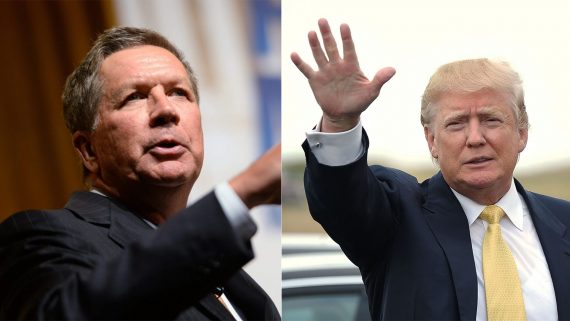

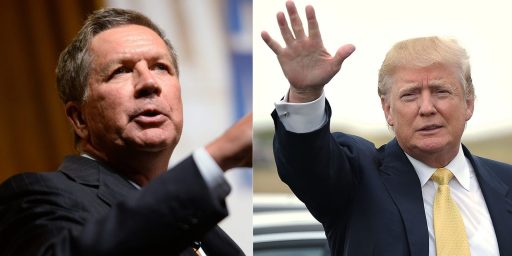

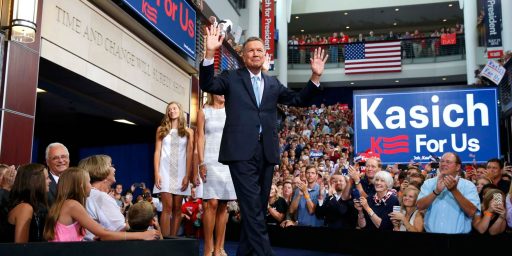
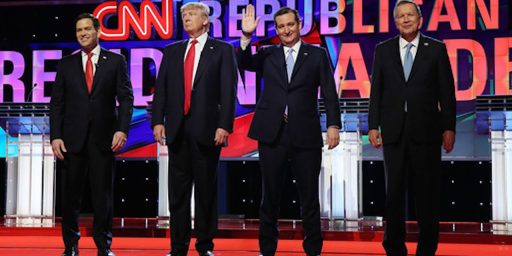
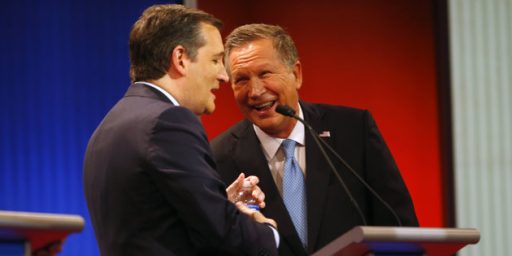
For Trump, it’s simple. Michigan proves whether he recovered from the worst week of his campaign or whether the wound is permanent. If Trump were smart, this would be easy-working class whites in Michigan are very hostile to both parties at the moment-but he’s been reverting lately back to economic plutocratism. Can his position on free trade trump (no pun intended) his flip flopping on wages and visas? Some Snyder bashing wouldn’t hurt either, considering he’s part of Romney’s crowd.
Kasich? Litmus test on if he can survive to get into the top 3. He needs a strong second over Cruz, I think. The Texan evangelical favorite of AIPAC blasting New York Values really shouldn’t be doing this well in Michigan. Kasich needs to ignore Trump for now and focus all his ammo on Cruz.
Kasich is delusional.
The party that Kasich could actually win in hasn’t existed since 2008. Which Cruz supporters are going to switch over to Kasich? Which Trump supporters will be gain? I can see some Rubio supporters moving over, but not many.
Kasich is the Huntsman of this election. He’s loved by Democrats, and sneered at by “real” Republicans. So he will win Ohio? So what. How does he get to 8 states? Or does he really believe that in a brokered convention, they’ll bypass all three of the guys who had more delegate to crown him the winner?
Delusional.
@EddieInCA:
You’d be surprised at who people will support. Bobby Kennedy did well both with Northern Wallace voters and with inner city blacks.
I could see some Trump supporters going for Kasich, provided he’s smart about how he courts them. He needs to be more of a rough Pittsburgh Slavic dick, more openly willing to demand a higher price from the Establishment in terms of flexibility than Rubio. Some won’t. Like Cruz in that regard. The Trumpistas are a surprisingly ideologically diverse bunch.
What I don’t see is any Trump supporters going for Rubio like the Establishment wants. Nothing can be done about that until he loses Florida and the lesson hits home.
@John:
Kasich isn’t a Kennedy. Right now, his poll numbers nationally are a rounding error. He’s currently behind Trump even in Ohio, per PPP.
http://www.publicpolicypolling.com/main/john-kasich/
So he wins Ohio? So what. Where else does he win?
@EddieInCA:
I never implied that he was-the implication is for picking up Trump supporters, not blacks.
When Rubio is devastated in the next couple of weeks, he’ll be the only one left. His only shot will be to pit the two against each other, enough to send the game into overtime in Cleveland where he is kingmaker. That’s not a hard thing to do per se, particularly if you can goad Trump into taking unambiguously Cruzite economic ideas. I just sometimes wonder whether he has the political ability to do it.
@EddieInCA: RCP’s aggregation shows the same. Kasich is behind Trump in OH. If he catches the breaks Kasich might be able to just squeeze by in his home state. Kasich is gaining in MI, apparently at Rubio’s expense and picking up some of Carson’s supporters. But Caron and Rubio don’t have enough support left for Kasich to catch up if he got all of it.
@gVOR08:
That’s why he needs to aim all his ammo until March 16th at Ted Cruz while The Donald is too occupied with his anal rape of Rubio to bother with Kasich. And if you can’t make up successful negative ads about Ted Cruz and his Koch Brother fantasies in Michigan, you shouldn’t be in the ball game.
Again. So he wins Ohio? So what! How the hell does HE – Kasich – become Kingmaker? What happens to Trump supporters if the “Party” denies him the nomination at the convention when he has the plurality of delegates by a significant margin? You think they’re going to line up behind the Party choice?
If so, you’re delusional, too.
How the hell does Kasich stay in, even if he wins in Ohio 35%-33%? What’s the point? Where else does he win?
I still think that Cruz is the last best chance for Republicans to run a “no excuses” candidate. He’s the only non-RINO of the bunch. If he gets the nomination base Republicans will not be able to complain that a RINO headed up the Ticket.
A final note: If Cruz loses the election, base Republicans will no doubt complain the Republican establishment didn’t adequately support the Cruz candidacy. Base Republicans are a self-proclaimed, permanently victimized ,group of people.
@al-Ameda: They’ve very good at excuses. They’d find a hundred ways to say Cruz had failed conservatism.
I don’t think Kasich is staying in to become the nominee. It’s either for a legit showing for the VP slot (Ohio is a big deal as a swing state, and if Hillary picks Sherrod Brown…), or, he’s staying in as part of the effort to deny Trump the 1237 magic number. He needs to do well, yes, but I don’t think he’s delusional–I think there are other factors that may be at play here.
OT, but here’s an analysis of Trump’s attack haiku.
Speaking of Michigan…Sanders defied–no, not defied, completely blew away in epic fashion–expectations (polling had him down 21 points) to win the state.
Very true…but Hillary still walked away from last night with more delegates than Sanders…
@An Interested Party:
Yes, she did–but many of the upcoming primary states are a lot more like Michigan than they are Mississippi.